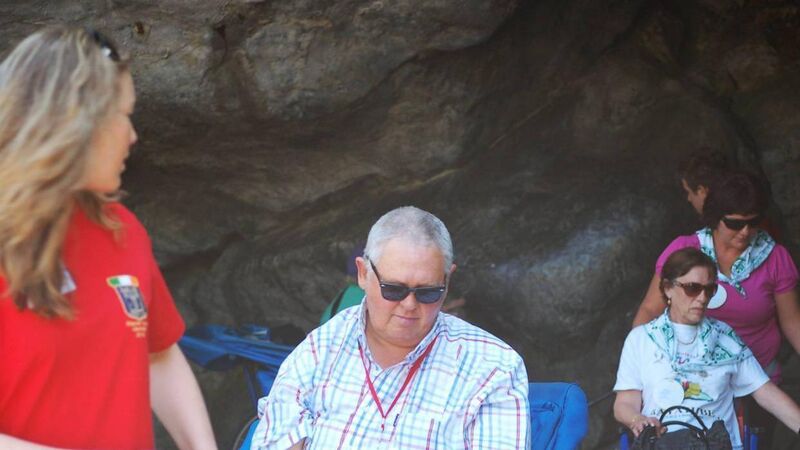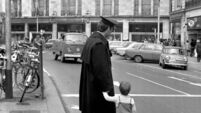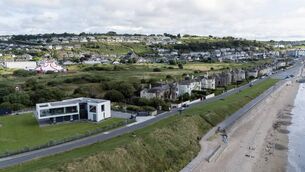John Arnold: I wept as we buried Michael, a friend who lived life with gusto

It might have been said in a light-hearted manner on occasions, but in truth it harks back to an Ireland of long ago.
Going to live or stay for a term in ‘the Workhouse’ was seen as really the last resort – the ignominy of having no house, no home, in many cases no family or relatives.
In an era when the term ‘healthcare’ wasn’t invented or understood, poverty-stricken people had no option but to plead for a bed in a local Workhouse.
In the early 1830s, the English Government introduced the Poor Law system to Ireland whereby Poor Law Unions were established all over the country to provide some limited care for the destitute of Irish society. The ratepayers (persons of property) elected local Poor Law Guardians to operate the system. It was only in 1923 that the regime was finally dismantled in this country.
Around 1839, an English architect, George Wilkinson, arrived in Ireland and was given the job of designing over 130 Workhouses which were to be built. With separate male and female sections, most of the Workhouses accommodated several hundred ‘inmates’ - as they were often referred to. The regime was spartan with no luxuries such as meat or fruit ‘on the menu’.
During the terrible Famine of the 1840s, the Workhouse system was totally overwhelmed with literally thousands of starving and sick people cramming the halls and corridors of the buildings. A million emigrated, and hundreds of thousands of the million that died, did so in the Workhouses. No wonder it became a symbol of destitution, illness, and abject poverty.
Over the decades after the famine, many of the old Workhouses were left derelict and some crumbled away whilst others were demolished.
Work on the Fermoy Workhouse commenced in 1867, the year of the Fenian Rising. By then the building in Midleton was already in use for quarter of a century. Built around 1840, it originally had accommodation for 800 persons.
Fermoy Workhouse has long since lost that name and is now St Patrick’s Community Hospital, which is dedicated to Our Lady of Lourdes.
Both that and the Midleton building were General Hospitals for many years, incorporating surgical, medical, and maternity services. Rationalisation has meant that such services are now in reality the preserve of hospitals in Cork city, Bantry, and Mallow.
Truly ‘all’s changed, utterly changed and two outstanding beauties have been born’. The role of the community hospitals in East and North Cork has at last been fully recognised.
With constant downgrading in the 1960s and 1970s, the fear existed that both Midleton and Fermoy hospitals might close down completely. Thankfully, the corner has been turned and multi-million Government investments, along with brilliant local fund-raising, has secured the future of these really special places.
It was in the late 1970s that I first started visiting St Patrick’s in Fermoy. Locals like Bill Cronin and Paddy ‘Fagin’ Ahern were residents there at the time. In 1984, Paddy Geary, who had worked here on our farm for three generations of Arnolds, was a patient there.
Paddy died in 1985. I still recall Christmas Night of 1984 up on the top floor in the open plan ward where he was. It was a very special occasion for me with all those men who regarded St Patrick’s as their ‘home’. One person I knew well was a very quiet man named Leo Fox.
I think he was in his eighties then. He had no relatives of any kind.
The story was that in the last year of the reign of Pope Leo, around 1903, a little new-born baby boy was found on a roadside near a fox den. He was christened Leo Fox and raised in Fermoy Hospital. He worked for farmers in his adult life then spent the remainder of his life back where he started, in St Patrick’s.
Leo was a big, strong gentle man who kept to himself. His family were the staff in Fermoy Hospital and he was treated with great tenderness and dignity, and in every respect St Patrick’s was his home - he loved it.
I thought in a special way of Leo last week when I attended a funeral mass in the Church of Our Lady of Lourdes in Midleton Community Hospital.
To paraphrase Florence Wilson’s poem about the Cork-born United Irishman, Thomas Russell: “Into our town, on a night of snow, came a man from God knows where. None of us bade him come or go, nor deemed him friend, nor damned him foe”.
That poem, though written in 1918, could well have referred to Michael Cotter, who died last week. He could truly be described as a ‘man from God knows where’. He came to Midleton and worked for a term in the Irish Meat Packers (IMP) factory in the town.
His background was a mystery to one and all - including Michael himself - but that never came against him.
Midleton became his home and Michael became a Midleton man. Big in stature with a slight limp, he always called me Johnny Arnold -and that was fine with me.
I went to Lourdes to mark my half century on this earth in 2007. Around that time I used visit Jim Willis in Midleton Hospital and there I also met Kathleen Leahy - a neighbour of Jim’s from Dungourney.
At that time, Michael had come to stay as a resident in the hospital and we were introduced to each other.
Michael loved his annual trip to Lourdes in June each year with the Cloyne Diocesan Pilgrmage. If you offered him a choice of a month in America or Australia or the six days in the South of France - well, Lourdes was always his only choice.
Though wheelchair-bound in recent years, Michael enjoyed with gusto his time in the little town under the Pyrenees. He loved going shopping, having a pint too - but all the different pilgrimage activities -well, they were like winning the Lotto for him. And Holy Water - gallons of the precious liquid - was so important to him.
If you met him in the hospital around Christmas, twas “Well Johnny, ’twont be long now til Lourdes again”.
At Michael Cotter’s funeral mass last Thursday in Midleton Hospital Chapel, Fr Jim Killeen paid tribute to his carers: “Michael’s family were the staff -former and present, of this hospital. Ye were his family and loved and cared for him so well”
As his coffin left the church to the strains of ‘The Bells of the Angelus call us to pray….’ his Midleton Hospital family wept for their friend.
Yes, tears of sadness, but oh, how much happiness and joy have so many kind people in these old ‘Workhouses’ brought to men like Leo Fox and Michael Cotter.
Please God, I will light candles for ye all in Lourdes next week.







 App?
App?




